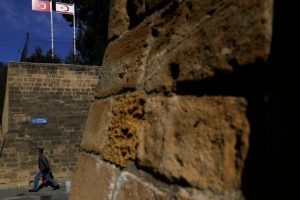GENEVA — Turkey’s president declared on Friday that Turkish troops would remain in Cyprus “forever,” complicating hopes of reuniting the island nation, which has been effectively partitioned since 1974.
“Greece is fleeing again from a solution to the Cyprus problem,” the president, Recep Tayyip Erdogan, told reporters in Istanbul on Friday. “Turkey will be in Cyprus forever.”
That said, Mr. Erdogan often takes a firmer line with domestic audiences than with foreign ones, and diplomats said they remained cautiously optimistic.
In 1974, a coup sponsored by the military junta that controlled Greece at the time ousted the government of Cyprus, and Turkey invaded, arguing that the Turkish Cypriots needed its protection. The nation has been largely stable and peaceful for decades, but this is one of the world’s thorniest and longest conflicts.
Since the late 1970s, leaders of both the Greek Cypriots and the Turkish Cypriots have agreed in principle on a “bizonal, bicommunal federation” as the basis for reunification, but have different understandings of that term.
The latest round of negotiations, sponsored by the United Nations, has been promising. On Thursday, the foreign ministers of Britain, Greece and Turkey — the three countries that are designated as “guarantors” of the nation’s sovereignty under a 1959 treaty — met in Geneva, prompting the new United Nations secretary general, António Guterres, to observe that Cyprus could be “a symbol of hope” this year.

Among the key issues in dispute are the return of displaced Cypriots and the handling of their property, repatriation of Turkish settlers, demilitarization of the island, and the future role of Greece, Turkey and Britain.
Mr. Erdogan on Friday said firmly that Turkey would not withdraw from the island as long as Greek troops were also stationed there. “Full withdrawal of Turkish troops from Cyprus is not possible,” he said. “If this is being discussed, then both sides must withdraw.”
The Turkish foreign minister, Mevlut Cavusoglu, maintained the Turkish position while also leaving room for negotiation.
“Taking into consideration the current situation in our region, the continuation of the security and guarantees system, which has been the solid basis of the 43-year-long security and stability on the Island, is a necessity,” Mr. Cavusoglu said in the statement, referring to the system of guarantors, which Turkey used as its rationale for the 1974 invasion. “We expect this issue to be discussed in line with the realities on the island.”
Cypriot leaders held out hope for an agreement.
The Greek Cypriot leader, Nicos Anastasiades, noted that both sides had submitted maps detailing the redrawing of internal boundaries, a promising first; that Turkey had agreed to discuss the issue of the security guarantees, itself a sign of progress; and that both sides had made progress in discussing areas like governance, the economy and Cyprus’s involvement in the European Union, which it joined in 2004, notwithstanding the divisions.
Mr. Anastasiades and the Turkish Cypriot leader, Mustafa Akinci, both said that they had agreed that the security of one community should not be perceived as a threat by the other community.
“The point is, where can you strike a balance: How can you find the ways and means so that both communities of this beautiful island can feel safe and secure?” Mr. Akinci said, adding that the Turkish Cypriot community “feels that they need the continuation of some sort of a guarantee coming from Turkey.”
CYPRUS
“This is how they feel,” he said. “All the polls, more or less, say the same thing. How can we deal with this issue so that it’s acceptable by the other party?”
He added: “We are here to discuss all these issues. There are no taboos.”
The last time a peace deal was close at hand, in 2004, it was accepted by the Turkish Cypriots in a referendum but rejected by the Greek Cypriots. All sides are trying to avoid a repeat of that experience.
Mr. Akinci said that reunification would lead to major economic benefits, including the possibility of channeling natural gas deposits through Cyprus to Turkey and Europe, and distributing water that is currently piped to northern Cyprus from Turkey across the whole island.
Turkish Cypriots are estimated to make up about one-fifth of the island’s population, and the Greek side had proposed a rotating presidency, but how it would be carried out remains in dispute.
Asked about Mr. Erdogan’s remarks, Espen Barth Eide, the United Nations secretary general’s special adviser for Cyprus, said he did not think the talks were in trouble.
Negotiations on technical matters have been scheduled for Wednesday, and Mr. Eide said, “We’re close to completion” on five areas of agreement — not including the issue of security and guarantees. “Not easy, but the will is there,” he said, while reminding both sides that “we must not lose any time.”
Mr. Eide added, “It will be hard.”




